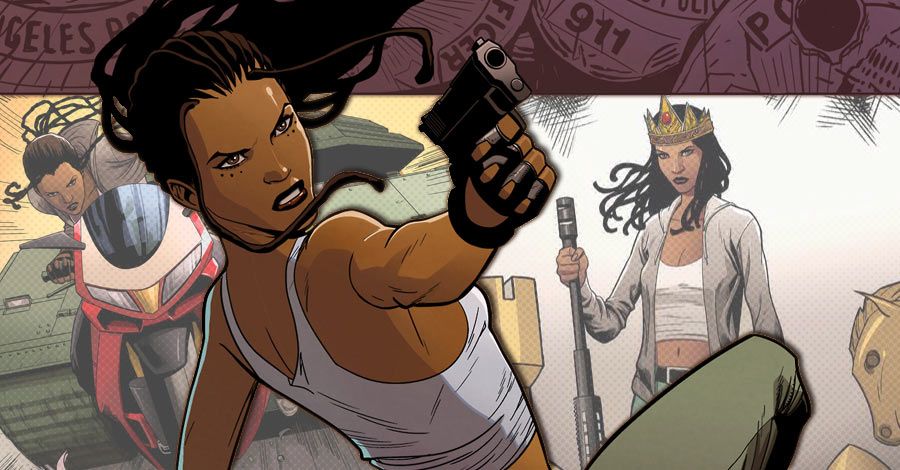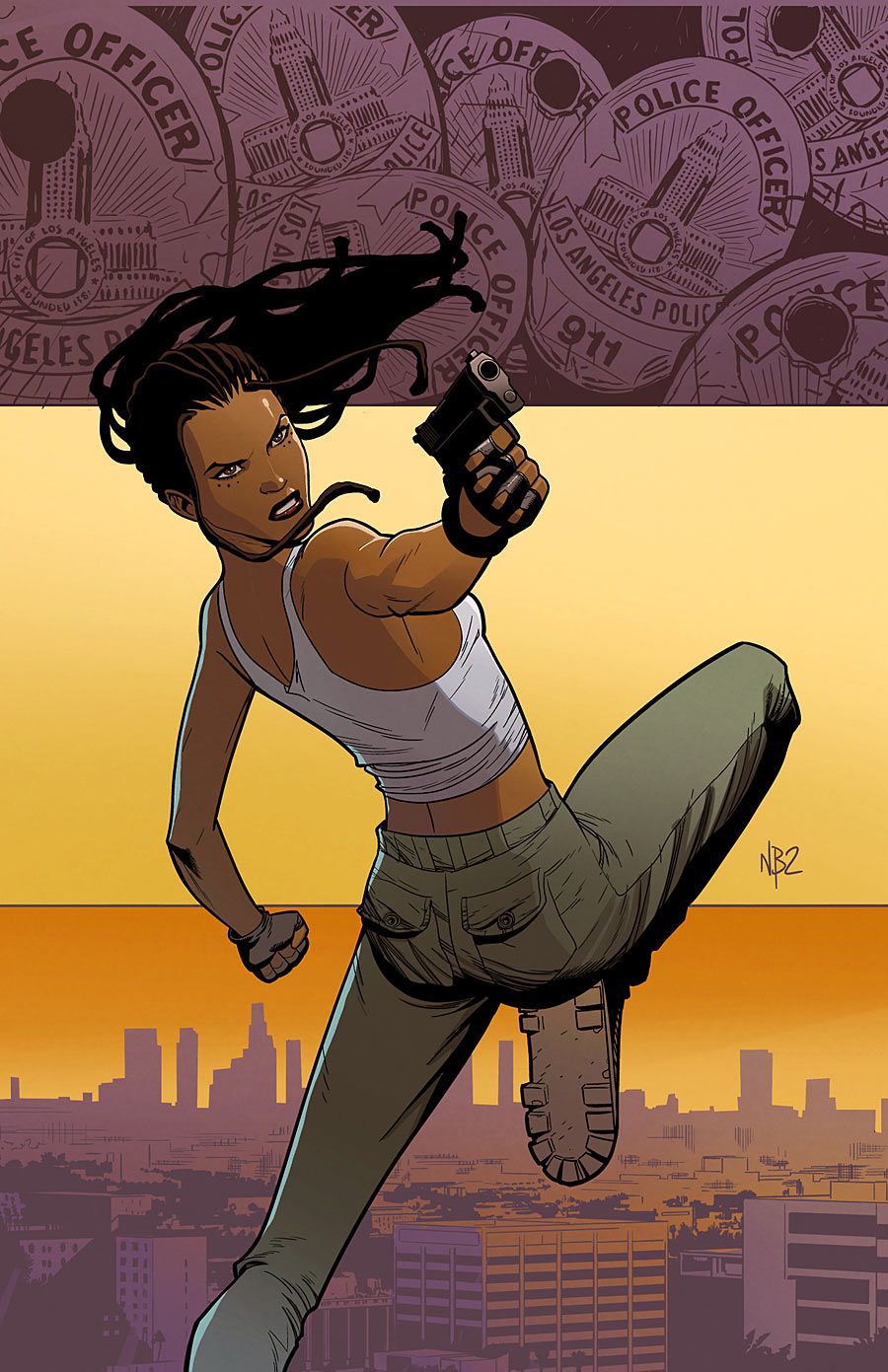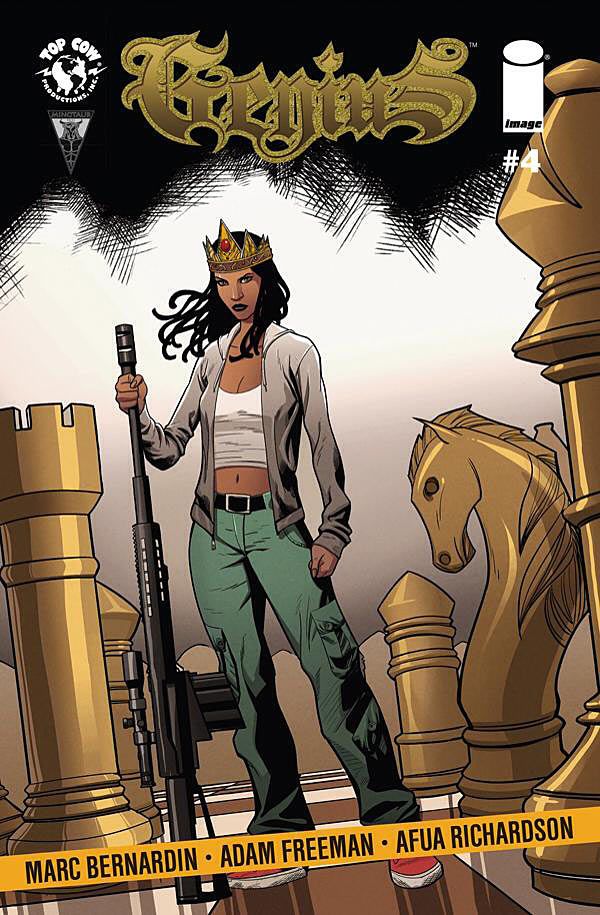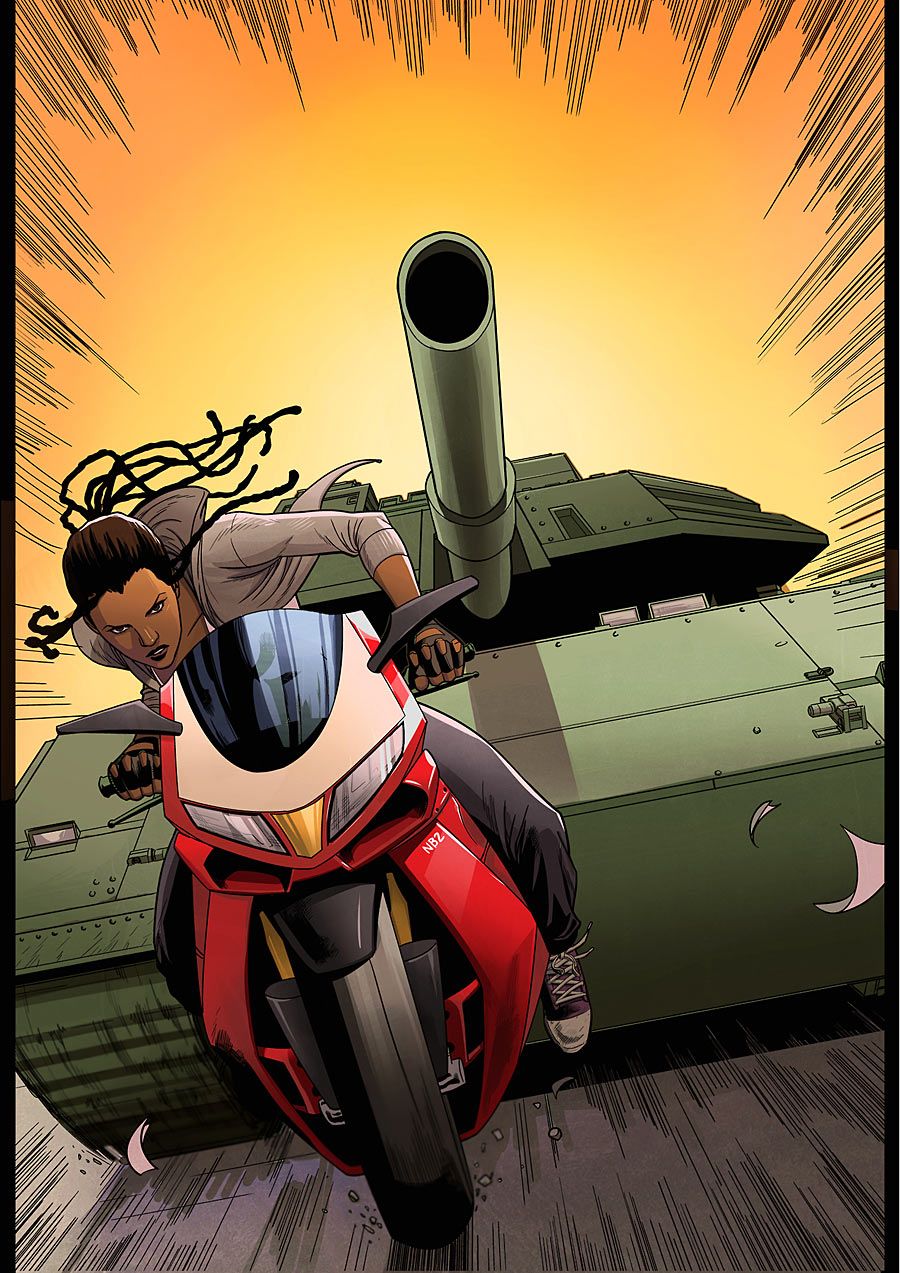Writers Marc Bernardin and Adam Freeman didn't set out to write a timely comic book. "Genius" started as a one-shot for Pilot Season 2008, becoming one of the annual Top Cow Productions competition's two winners -- only the rest of the story, a five-issue miniseries following up on the initial pilot, wasn't scheduled for release until August of this year. Unexpectedly, the long release cast "Genius" in a newly relevant light, with the book released weekly at a time when the death of Michael Brown and subsequent civil unrest in Ferguson, Missouri has put race relations and distrust of the police firmly in the zeitgeist.
RELATED: Marc Bernardin & Adam Freeman Start Urban Warfare in "Genius"
The story of Destiny is one steeped in America's racial strife. Destiny Ajaye, the "Genius" of the title, is a leader and tactician whose skill is equal to a Hannibal or Napoleon, but she doesn't command an army in the traditional sense of the word. Instead, she organizes Los Angeles' various gangs in an uprising against the LAPD. As revealed exclusively to CBR News, Destiny's world is about to get much bigger in an upcoming sequel from Top Cow. While the events of "Genius" are quite different than what occurred in Ferguson, the parallels between the fictional story of a minority population surrounded by an oppressive, violent police force and the one occurring in real life are not lost on Bernardin and Freeman, who granted CBR the first interview about the sequel.
CBR News: How would you broadly describe the sequel? Who are the characters, what's the central conflict and how does it relate to the current "Genius" miniseries?
Marc Bernardin: Adam and I are still fine-tuning what the sequel will be. And, as such, there's a lot we're going to keep close to the vest -- since the vest might change between now and publication. But our primary focus is on challenging Destiny in ways she had never been challenged before and introducing her to a bigger world, with bigger obstacles and bigger weapons.
Adam Freeman: It would be very easy to do more of the same, but from the beginning "Genius" has been a book outside of the norm so we want to keep everyone (including us) on their toes.
What motivated you to write "Genius" and its sequel?
Bernardin: All great stories start with character and conflict. The spark of Destiny came from rubbing the social realities of inner-city life up against the concept of the prodigy. The conflict gave birth to the character, in more ways than one. The thing every storyteller wants is for their story to find an audience, and we're grateful that it did -- both from Top Cow and the world at large. There's a lot more to this story, and we're thrilled to get to tell it.
Freeman: We have a different relationship with every story we create. Some go in the "that would be fun" pile and some go in the "holy shit, this is a story we have to tell" pile. Destiny falls into the latter. Our motivation to write it was simply, "We have to." Some story ideas are fleeting thoughts, some will continue to rattle around in your head until you write them.
How have other crime comics, police shows and cop/gang movies informed how you do "Genius?" Is there anything you're reacting to or against?
Bernardin: Adam and I are professional ingesters of pop culture -- if we didn't have the jobs we have, we'd just be the guy a few cubicles down who knows way too much about movies and TV and won't shut up about it. So we've got decades of stuff rolling around in our heads that gets synthesized, blended, processed and spit out in various ways. More than direct us toward stories we'd like to tell, all that knowledge ends up demarking the areas we want to steer clear of. "That's already been done. Let's find something new."
Freeman: So many people have said nice things about "Genius," but I consider the biggest compliment, "I've never seen something like this before." That means despite our conscious or subconscious influences we were able to create something original. Too many people use the term "homage" to mask ripping something off.
Bernardin: Attempting to [react to other media] with a print comic is dangerous. At best, you'll be woefully behind the times, given the amount of time between idea and release. At worst, you won't have the clearest picture of the thing you're reacting to while you're making the comic -- so you'll just seem misinformed. "Lucky" is the wrong word to use, when it comes to the timing of "Genius"' release coinciding with the situation in Ferguson, Mo., but there's no way we could've know when we started thing journey, seven years ago, that the real world would explode just as our comic book world did. Reacting to an event is folly, but reacting to an enduring condition isn't.
Freeman: Comics are a long lead medium for the most part. The writing takes time, the art takes even longer. Then the soliciting, shipping and so on. If something in the zeitgeist lines up perfectly like this it is truly lightning in a bottle. For better or worse we managed to tap into something extremely relevant in our society. To try to manufacture that the second time around would be foolish. The worst thing you can do is chase a trend rather than try to set it.
RELATED: Bernardin & Freeman Talk Top Cow's "Genius"
The events in "Genius" are fairly violent and seem to happen in a fictional version of our world. How is writing about armed conflict in the real world different than writing a super hero or genre book? Are there any specific things you do differently?
Freeman: We did a lot of research into the procedures and order of tactical events local law enforcement and the government would take. It really is all about making it grounded. At the same time, you have to put story above all. If a reader is thinking, "Is that really the tank they would use?" then you haven't hooked them on the story and you have a much bigger problem.
Bernardin: It's all about fidelity of intent: If we stay true to the reality of the situation, then we're fine -- whether that reality features tanks and gangsters or mutants and lasers.
What do you think of Destiny and her actions? If you saw her on the news in the real world, what set of reactions would you have?
Freeman: You may not agree with a hero or villains actions but you should be able to empathize and understand why they think they need to take this course of action. If I saw Destiny or the wake of her actions on the news I would probably be sad for the additional loss of lives but would understand why, if any body of people felt they were being attacked, they would defend themselves. Another important factor would be how the news covers it. It is getting harder and harder to tell what the real story is. Depending what the current vibe of the nation or city was at the time she would either be painted as a villain or a hero and whether we like it or not, that influences our opinions.
Bernardin: Yeah, the news as we know it has lost much of its authority. In my eyes, anyway. Watching the way Fox News reframes current events through its own ideological prism, or MSNBC or "Vice." It feels like today the only way to be informed is to do your own news collation: You got a much better picture of what was happening in Ferguson from Twitter than you did from TV. But if I heard the truth of what was happening during Destiny's Siege of South Central -- yeah, that's a frustration I can understand.
"Genius" puts issues like race and gender at the forefront. In your reading of things, how well or poorly do you think mainstream comics have dealt with African-Americans and women? I know that this is a giant, messy question, but I'd be ignoring an elephant in the room if I didn't ask it.
Freeman: I definitely think that race and gender are not equally represented in comics. I don't think anyone can argue that. I can't speak to demographics or the motives behind companies not supporting more diverse characters. From my point of view, Marc and I have always served the story first. What works best for the character and their journey? With "Genius," obviously her race was integral to the story. In our other books we ask the same questions and if the answer is "it doesn't matter" we assign race and gender however we want.
Bernardin: I feel like comics has done about as well as it can for an industry that was, until very recently, run almost exclusively by white men. You hire the people you know, you tell the stories you know. That's not assigning blame, that's just human nature. Some people have more open minds than others, of course, but that's just the way it is. So, yeah, there weren't a lot of brown faces or lady faces working behind the scenes, actively or inactively thinking about diverse content. When that wall fractured, and people like Karen Berger and Axel Alonso (among others) got hiring power, the faces in comics changed. The types of stories being told change. But not enough. We've got a long way to go before the pages reflect the world.
Stay tuned to CBR News for more on the upcoming "Genius" sequel from Top Cow's Minotaur Press imprint.




